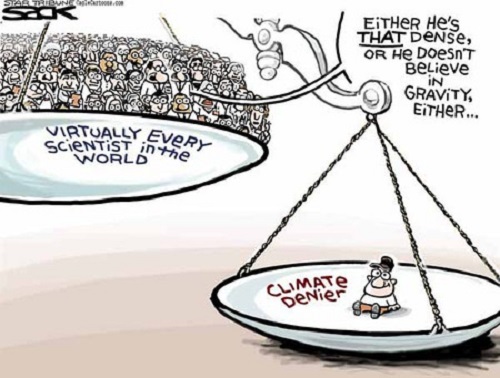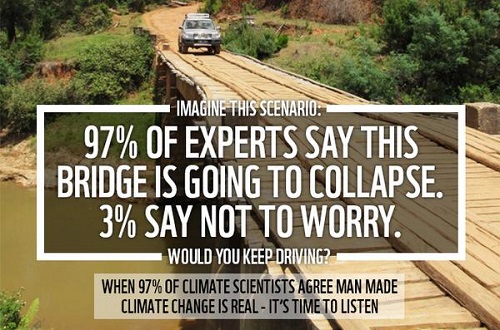
Dana's Global warming denial rears its ugly head around the world, in English drew the highest number of comments of the articles posted on SkS during the past week. Dikran Marsupial's 2014 Arctic Sea Ice Extent Prediction generated the second highest.
in his article, Climate Change Impacts in Labrador, Robert Way can be seen holding the Labrador flag during a field season studying glaciers in the beautiful Torngat Mountains National Park.

"We have found that, since 2009, the volume loss in Greenland has increased by a factor of about two, and the West Antarctic ice sheet by a factor of three," said glaciologist Angelika Humbert, one of the study's authors. "Both the West Antarctic ice sheet and the Antarctic peninsula, in the far west, are rapidly losing volume. By contrast, East Antarctica is gaining volume, though at a moderate rate that doesn't compensate for the losses on the other side of the continent."
'Incredible' rate of polar ice loss alarms scientists by Robin McKie, The Observer/The Guardian, Aug 23, 2014
Quantifying the consensus on anthropogenic global warming in the scientific literature, Cook et al, 2013, Environmental Research Letters, is cited and linked to in Chris Mooney's Mother Jones article, Why Ignoring Global Warming Is Like Driving Across a Rickety Bridge. The tease line for Mooney's article is A viral tweet perfectly captures just how irresponsible climate denial is. The viral tweet was from the WWF UK and included the following graphic:

Michael J.L. Brown links to the SkS rebuttal article, What does past climate change tell us about global warming? in What I learned from debating science with trolls posted on The Convesation.
In 2003, Global Footprint Network, a 501c (3) nonprofit organization, was established to enable a sustainable future where all people have the opportunity to live satisfying lives within the means of one planet.
An essential step in creating a one-planet future is measuring human impact on the Earth so we can make more informed choices.
That is why our work aims to accelerate the use of the Ecological Footprint — a resource accounting tool that measures how much nature we have, how much we use, and who uses what.
The Ecological Footprint is a data-driven metric that tells us how close we are to the goal of sustainable living. Footprint accounts work like bank statements, documenting whether we are living within our ecological budget or consuming nature’s resources faster than the planet can renew them.
Our efforts are fueled by a future vision in which human demand on nature is monitored as closely as the stock market. A time when designers are shaping products, buildings, and cities that have one-planet Footprints. A world where all humans prosper and development succeeds because we are finally recognizing ecological constraints and using innovation to advance more than just the economic bottom line.

Posted by John Hartz on Sunday, 24 August, 2014
 |
The Skeptical Science website by Skeptical Science is licensed under a Creative Commons Attribution 3.0 Unported License. |